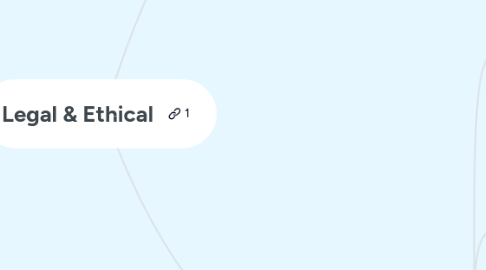
1. Ethical Issues
1.1. Public safety
1.1.1. Driverless cars
1.1.2. Social media
1.2. Privacy
1.2.1. We have a right to control our data. Companies have a legal responsibility to ensure it is kept private!
1.3. Data security
1.3.1. Companies collect our data and they have a legal responsibility for it
1.4. Intellectual property rights
1.4.1. Content of the WWW
1.4.1.1. Images
1.4.1.2. Video
1.4.1.3. Sound
1.4.1.4. Text based media
1.4.2. Apps & Software produced
1.4.2.1. Games
1.4.2.2. Bespoke software
1.5. Surveillance camera
1.6. Drones
2. Legal
2.1. Copyright Design and Patents Act 1988
2.1.1. It gives the creators of literary, dramatic, musical and artistic works the right to control the ways in which their material may be used. ... Normally the individual or collective who authored the work will exclusively own the rights
2.2. Computer Misuse Act 1990
2.2.1. 1. Unauthorised access to computer material. This refers to entering a computer system without permission (hacking) 2.Unauthorised access to computer materials with intent to commit a further crime. This refers to entering a computer system to steal data or destroy a device or network (such as planting a virus) 3.Unauthorised modification of data. This refers to modifying or deleting data, and also covers the introduction of malware or spyware onto a computer (electronic vandalism and theft of information) 4.Making, supplying or obtaining anything which can be used in computer misuse offences
2.3. RIPA (Alevel)
2.3.1. ISP provide access to Customers comms
2.3.2. allow mass surveillance
2.3.3. demand ISP fit equipment for mass surveillance
2.3.4. allow monitoring of individuals internet activity
2.3.5. prevent the existence of such interception activities being revealed in court
2.4. Freedom of Information Act 2000
2.4.1. The Freedom of information Act 2000 provides public access to information held by public authorities. It does this in two ways: public authorities are obliged to publish certain information about their activities and members of the public are entitled to request information from public authorities
2.4.1.1. You can request information from some public authorities, such as: government departments, devolved administrations, other public bodies and committees local councils schools, colleges and universities the NHS - including hospitals, GPs, dentists, pharmacists and opticians publicly owned companies publicly funded museums, galleries and theatres the police and fire services registered social landlords in Scotland
2.4.1.1.1. within 20 days they must respond. Could be a small fee for photocopying
2.4.1.1.2. Some sensitive information not allowed to be shared
2.4.1.1.3. if the cost to retrieve the data is more than £600 it could be turned down
2.4.1.1.4. An organisation can refuse your request for environmental information, if they think the cost of getting the information is too high.
2.5. Communications act 2003 (Alevel)
2.5.1. Sending offensive communications
2.5.2. Access an internet connection with no intention to pay. (piggyback)
2.6. Equality Act 2010 (Alevel)
2.6.1. direct or indirect discrimination
2.6.2. The programs/APPS etc can everyone access them?
